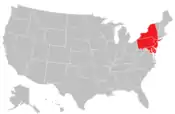Middle States Commission on Higher Education
The Middle States Commission on Higher Education (abbreviated as MSCHE and legally incorporated as the Mid-Atlantic Region Commission on Higher Education) is a voluntary, peer-based, non-profit membership organization that performs peer evaluation and accreditation of public and private universities and colleges in the United States and foreign higher education institutions. Until federal regulations changed on July 1, 2020, it was considered one of the seven regional accreditation organizations dating back 130 years. MSCHE, which is now considered an institutional accreditor, is recognized by the United States Department of Education and the Council for Higher Education Accreditation.
 MSCHE operational area | |
| Abbreviation | MSCHE |
|---|---|
| Formation | 1887 |
| Legal status | Association |
| Purpose | Educational accreditation |
| Headquarters | Philadelphia, Pennsylvania |
Region served | Delaware, District of Columbia - (Washington, D.C.), Maryland, New Jersey, New York, Pennsylvania, Puerto Rico, U.S. Virgin Islands and international locations |
Board President | Heather F. Perfetti |
| Affiliations | CHEA and USDE |
| Website | |
Its headquarters are in University City, Philadelphia.[1]
Region and scope
The Middle States Commission on Higher Education is recognized by the United States Department of Education to accredit degree-granting institutions. Its traditional region was in the states of New York, New Jersey, Pennsylvania, Delaware, and Maryland; the District of Columbia (Washington, D.C.), plus the American territories/commonwealths of Puerto Rico, and the U.S. Virgin Islands (in the Caribbean Sea), that wish to participate in Federal "Title IV" student loan programs.[2][3] The Commission conducts business in 48 states, the exceptions being North Dakota and Montana; two U.S. Territories (Puerto Rico and the U.S. Virgin Islands); and the District of Columbia. Its footprint extends to 94 countries.
History
MSCHE grew out of the Middle States Association of Colleges and Schools (MSA), an organization established in 1887 to improve education using evaluation and accreditation. MSCHE itself was established in 1919 and was one of three Commissions of MSA until 2013 when MSCHE incorporated as a separate entity in Pennsylvania as the Mid-Atlantic Region Commission on Higher Education doing business as the Middle States Commission on Higher Education.[4] On July 1, 2019, MSCHE with drew from MSA and so completely severed ties.[5]
MSCHE has been recognized since 1952 by the United States Secretary of Education as a gatekeeper of student financial aid funding for postsecondary institutions that offer academic degrees ranging from two-year Associate’s through the Doctoral level.
Continuous reflection in the service of institutional improvement has been the hallmark of MSCHE for nearly 100 years. The 2014 Standards coupled with the revised cycle continues to elevate the Commission’s commitment. It also serves to channel energy and resources to those institutions demonstrating the greatest need for guidance and support, and provides a holistic accreditation cycle that has positioned MSCHE well into the next century.
See also
References
- Contact. Middle States Association of Colleges and Schools. Retrieved on July 5, 2019. "3624 Market Street, 2nd Floor West, Philadelphia, PA 19104"
- "College Accreditation in the United States - Pg. 6". U.S. Department of Education. Retrieved May 20, 2014.
- "Newsletter June 2010". Middle States Commission on Higher Education. Archived from the original on October 14, 2011. Retrieved May 20, 2014.
- "Frequently Asked Questions About the Middle States Association and the Middle States Commission on Higher Education". Middle States Commission on Higher Education. 2015. Archived from the original on March 4, 2016. Retrieved December 18, 2015.
- "1919-2019: The 100-Year History of the Middle States Commission on Higher Education". Middle States Commission on Higher Education. Retrieved October 1, 2020.